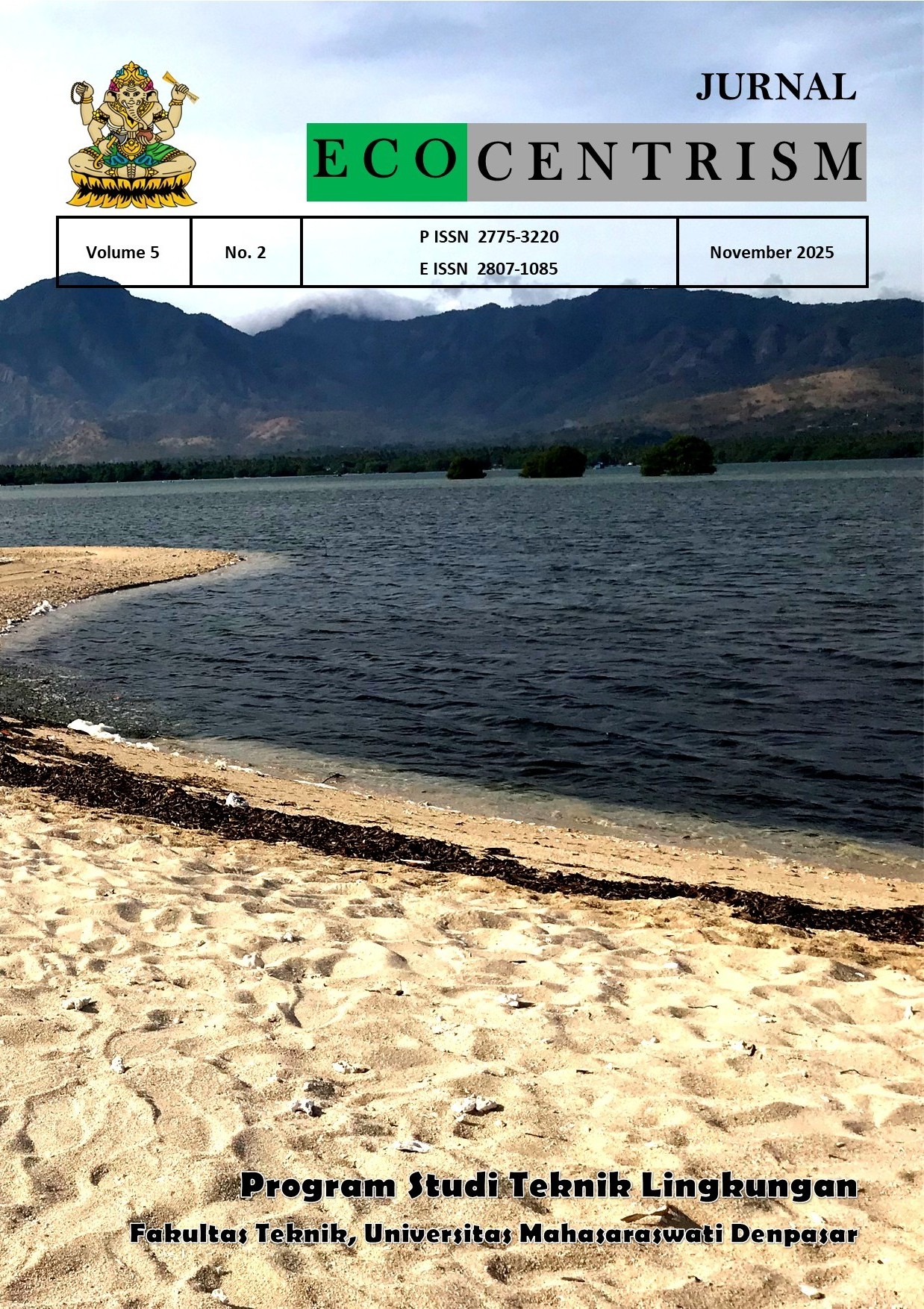PERBANDINGAN KARAKTERISTIK DAUN SINGKONG DI DAERAH RAWAN KEMACETAN DENGAN DAERAH TIDAK RAWAN KEMACETAN
DOI:
https://doi.org/10.36733/jeco.v5i2.12063Keywords:
Air pollution, Emissions, Plant leavesAbstract
The increasing number of motor vehicles each year has led to worsening air quality, with vehicle emissions being a major source of urban air pollution. This study aims to examine and compare the characteristics of cassava leaves growing in areas prone to traffic congestion. High pollution levels contribute to noticeable changes on the leaf surfaces. The research was conducted by collecting two leaf samples from different locations: (1) a roadside with heavy vehicle traffic and (2) a privately owned garden. The observed parameters included leaf color, texture, and the underside of the leaves. The results showed that cassava leaves exposed to high pollution levels experienced color changes (yellowish spots on the surface), rougher textures, and the presence of black dots or dirt particles on the underside, resembling vehicle emission residues. In contrast, leaves collected from the garden appeared unaffected by such conditions. These findings confirm that vehicle emissions significantly impact the characteristics of plant leaves.
References
Ajiwe, V. I. E., Chukwujindu, K. C., & Chukwujindu, C. N. (2018). Heavy Metals Concentration in Cassava Tubers and Leaves from a Galena Mining Area in Ishiagu, Ebonyi State, Nigeria. IOSR Journal of Applied Chemistry, 11(3), 54–58.
Amarullah, Didik Indradewa, & Yudono, B. H. S. (2016). Correlation of Growth Parameters with Yield of Two Cassava Varieties. Ilmu Pertanian (Agricultural Science), 1(3), 100-104. https://doi.org/10.22146/ipas.10706
Aminah, S., & Supriyadi, A. (2020). Pengaruh Polusi Udara Terhadap Pertumbuhan Tanaman: Studi Kasus Daun Singkong di Daerah Perkotaan. Jurnal Pertanian Berkelanjutan, 15(2), 123–130.
Anuforo, H. U., Akujobi, C. O., Ezeji, E. U., & Okehi, C. C. (2019). Impact of Vehicular Traffic on Concentrations of Selected Heavy Metals in Cassava Tubers Harvested from Roadside in Owerri, Nigeria. Food and Environment Safety, 18(4), 272–278. https://agris.fao.org/search/en/providers/122436/records/675ac0bd0ce2cede71d038bd
Bello Oluwasesan M., Hamisu A., Talata M., Ahamefula A., & Adewusi S. G. (2025). Cassava leaves: Unlocking the pharmacological treasures of a forgotten superfood. Records of Chemical Sciences, 4(2), 14-33. https://doi.org/10.33003/frscs-2025-0402/02
Budi, S. (2018). Karakteristik Tanaman Singkong dan Faktor Lingkungan yang Mempengaruhi Pertumbuhannya. Jurnal Agronomi, 10(1), 45–52.
Dewi, R. A., & Hidayati, N. (2019). Analisis kualitas daun singkong di berbagai lokasi: Dampak lingkungan dan pertumbuhan. Jurnal Ilmu Tanah dan Lingkungan, 12(3), 201–210.
Harrison, U. E., Osu, S. R., & Ekanem, J. O. (2019). Heavy metals accumulation in leaves and tubers of cassava (Manihot esculenta Crantz) grown in crude‑oil contaminated soil at Ikot Ada Udo, Nigeria. Journal of Applied Sciences and Environmental Management, 22(6).
Katono, K., Macfadyen, S., Omongo, C. A., Odong, T. L., Colvin, J., Karungi, J., & Otim, M. H. (2021). Influence of cassava morphological traits and environmental conditions on field populations of Bemisia tabaci. Insects, 12(7), 604. https://doi.org/10.3390/insects12070604
Kementerian Pertanian Republik Indonesia. (2021). Panduan budidaya singkong yang efisien dan berkelanjutan. Kementerian Pertanian.
Kusminingrum, N. (2025). Pengaruh stomata daun tanaman terhadap besarnya reduksi polusi udara. Jurnal Jalan Jembatan. Retrieved October 22, 2025, from https://binamarga.pu.go.id/jurnal/index.php/jurnaljalanjembatan/article/view/772
Maryana, Suwardi. (2020). Growth and yield of cassava leaves to the dose of manure and the position of planting stem cuttings. Journal TECHNO, 8(2). https://doi.org/10.31315/journal%20techno.v8i2.8267
Meanwhile, a review article: Travaglini et al. (2023). Macro‑Morphological Traits of Leaves for Urban Tree Selection for Air Pollution Biomonitoring: A Review. Biosensors, 12(10), 812. https://doi.org/10.3390/bios12100812
Mulyani, E., & Rahman, A. (2021). Studi Perbandingan Kualitas Daun Singkong di Daerah Rawan Kemacetan dan Tidak Rawan Kemacetan. Jurnal Sains Pertanian, 14(4), 300–310.
Nwineewii, J. D. (2020). Heavy metal concentrations in cassava leaves and tubers harvested from some communities in Gokana, Rivers State, Nigeria. British Journal of Chemistry, 7(5), 167–172.
Okereke, J. N., Nduka, J. N., Adanma, U. A., & Ogidi, O. I. (2020). Heavy metals in cassava (Manihot esculenta Crantz) harvested from farmlands along highways in Owerri, Nigeria. Turkish Journal of Agriculture - Food Science and Technology, 8(4), 800–806. https://doi.org/10.24925/turjaf.v8i4.800-806.2737
Omeje, K. O., Ezema, B. O., & Eze, S. O. (2024). Evaluation of pesticide residues and heavy metals in common food tubers from Nigeria. South African Journal of Science, 120(3/4). https://doi.org/10.17159/sajs.2024/15969
Shasabilah, T., & Retha. (2022). Karakteristik fisik, kimia, dan stabilitas termal serbuk pewarna alami daun singkong (Manihot esculenta Crantz) dengan variasi Tween 80 dan jenis basa. Repository Universitas Jember. https://repository.unej.ac.id/handle/123456789/114191
Shrivastava, R., & Mishra, A. (2018). Air pollution induced changes in foliar micro‑morphology of roadside shrub species, Thevetia peruviana and Plumeria alba in Rewa City, MP, India. International Research Journal of Environmental Sciences, 7(3), 1–7.
Sinaga, I. L., Suwarto, S., Purnamawati, H., & Guntoro, D. (2024). Growth and production of cassavas in intercropping system with cowpeas. Journal of Tropical Crop Science, 11(02), 128–136.
Sutomo, A. (2019). Pengaruh polusi udara terhadap daun tanaman jalanan di Kota Surabaya. Jurnal Lingkungan Tropis, 4(2), 121–130.
Tamtomi, D. A. D., Suhartatik, N., & Mustofa, A. (2018). Karakteristik kimia, fisik, dan organoleptik tempe dari daun singkong (Manihot esculenta). Jurnal Ilmiah Teknologi dan Industri Pangan UNISRI (JITIPARI), 3(1), 1–9. https://doi.org/10.33061/jitipari.v3i1.1984
Uka, N., & Belford, E. J. D. (2018). Response of roadside tree leaves in a tropical city to automobile pollution. Notulae Scientia Biologicae, 10(2), 207–215.
Wiyono. (2025). Potensi daun singkong (Manihot esculenta Crantz) sebagai pewarna alami. Teknotan: Jurnal Industri Teknologi Pertanian. Retrieved October 22, 2025, from https://jurnal.unpad.ac.id/teknotan/article/view/44304
World Health Organization. (2021). Ambient air pollution: A global assessment of exposure and burden. https://www.who.int/publications/i/item/9789241511353
Yana, D. P., Adhi Suastuti, N. G. A. M. D., & Santi, S. R. (2025). Kandungan logam Pb dan Cu dalam daun singkong (Manihot utilissima Pohl.) serta bioavailabilitas logam tersebut dalam tanah di Desa Gunung Salak, Tabanan. Jurnal Kimia, 19(1), 65–71. https://doi.org/10.24843/JCHEM.2025.v19.i01.p08


